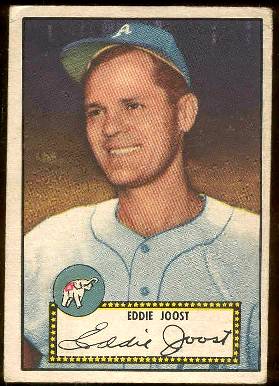1952 Topps # 45 Eddie Joost BLACK-BACK (Philadelphia A's)


Please wander around the website for more info, prices, values & images
on vintage baseball, football, basketball, hockey, sport and non-sports cards.
1970 Topps Baseball Cards |

1982 O-Pee-Chee (OPC) Baseball |

Airbrushing is the art of touching up a photo prior to the card being printed. It was generally done to remove imperfections or update or hide a players jersey/cap logo. Because of advancements in print technology and computers this is no longer needed.
All-Star card (AS) usually a subset card picturing a player who participated in the previous seasonís all-star game. Topps created these in their 1958 High Number issue and has continued the practice fairly regularly to date. Such cards are usually designated in price guides with the abbreviation of AS.
Assorted A general mix of cards often containing many duplicates.
Auction items are sold to the highest bidder. Auctions used to be live or thru the mail/phone but today most auctions are online.
Auction Catalog lists the rules and descriptions and often images of the items in an auction.
Authentication verification that an item (card, autograph) is genuine. Most "game-used" material inserts have a written declaration of authenticity on the reverse. Authorized Issue card or memorabilia item that has been properly licensed. If the item is of a player, his written permission must be given in order for it to be considered authorized.
